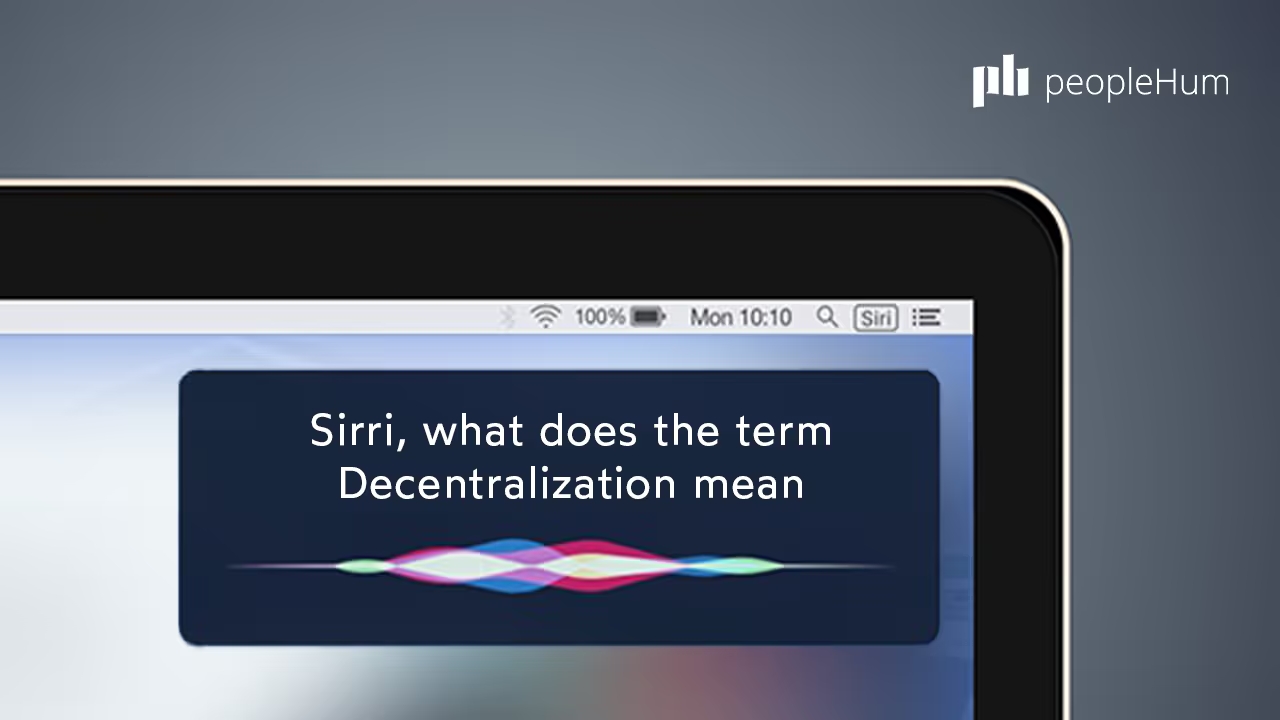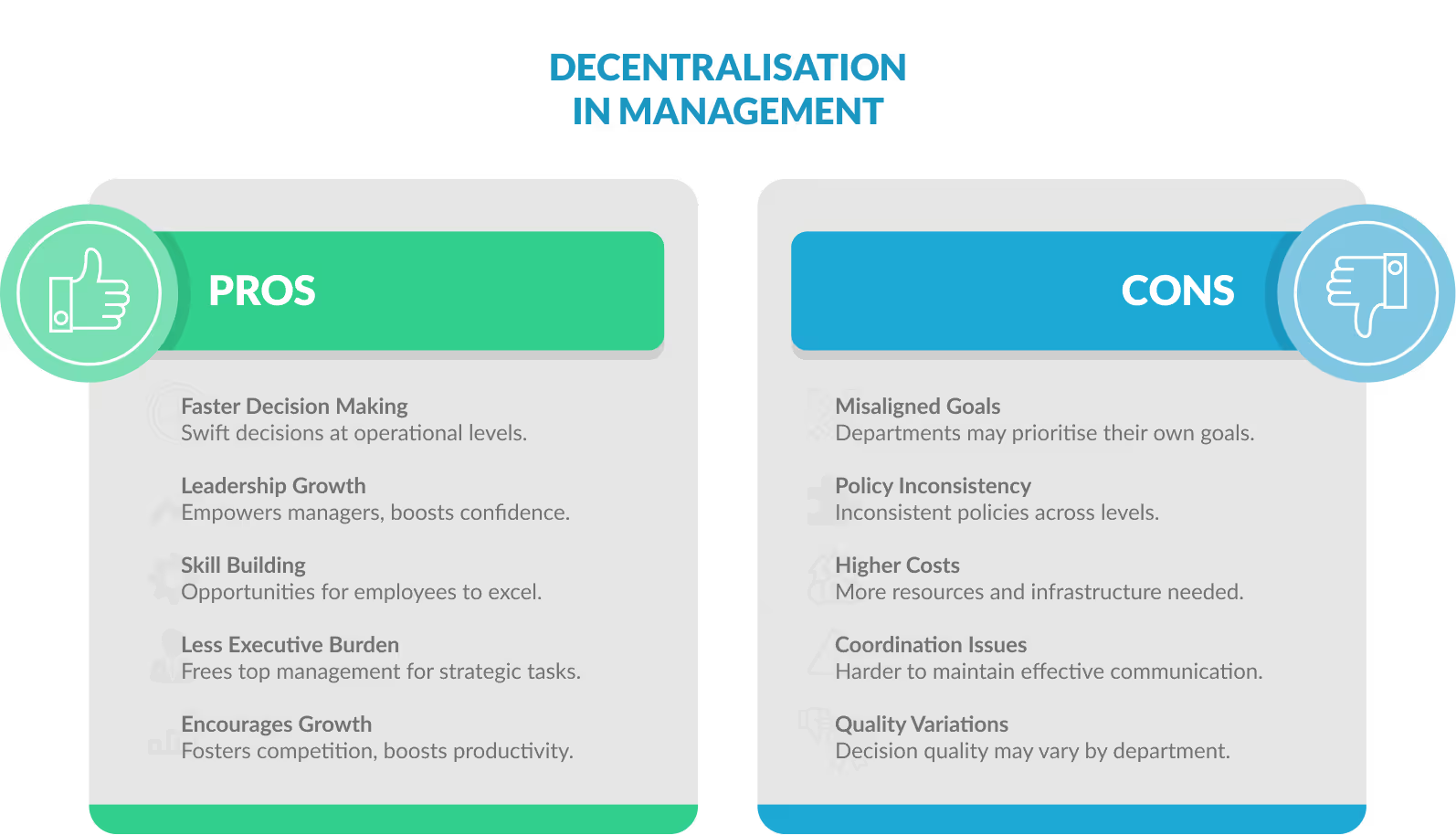What is Decentralization?
Decentralization refers to a specific form of organizational structure where the top management delegates decision-making responsibilities and daily operations to middle and lower subordinates. The top management can thus concentrate on making major decisions with greater time abundance. Businesses often feel the requirement of decentralization to continue efficiency in their operation.
Decentralization in management can be understood as the orderly assignment of authority, throughout the levels of management, in an organisation. It describes the way in which power to take decisions is allocated among various levels in the organisational hierarchy. In other words, it refers to the dissemination of powers, functions and responsibility, away from the central location.

Importance of decentralization in management?
Decentralization in management is crucial for enhancing organizational efficiency and fostering growth. Below are a few key reasons why decentralization is important:
Quick decision making:
In a decentralized management, decision making becomes quicker and better at the same time, by pushing down the power to make a decision to the operational level, which is nearest to the situation.
Executive development:
It encourages self-sufficiency and confidence amongst subordinates, as when the authority is delegated to lower levels, they have to rely on their judgement. By such delegation the executives are constantly challenged, and they have to find solutions, for the problems they face in the day to day operations.
Development of managerial skills:
In a decentralization structure, subordinates get an opportunity to prove their abilities. Management also gets a talent pool of competent manpower, which can be placed at situations that are challenging and breeds responsibility, by way of promotions.
Relieves top management:
It reduces the extent of direct supervision over subordinates by the supervisor, as they are given the liberty to decide and act accordingly, within limits set by the superior. As a result, the top management gets more time to take policy decisions.
Facilitates growth:
It confers greater independence to the lower management levels as it let them perform functions in the way that is most appropriate for their department or division. It propagates a sense of competition among various departments, to outperform others. This ultimately results in the increased productivity level and generates more return to the enterprise.
Effective communication:
The communication system of the organisation becomes more effective, through decentralization. It also builds a strong relationship between superior and subordinates. Decentralization lessens the burden of top-level management and gives actual work experiences to some middle and lower level executives, which improves their morale.
Types of decentralization in management
Decentralization in management involves distributing authority across various levels of an organization, enhancing efficiency and fostering growth. Here are the key types of decentralization commonly used in companies, along with concise examples:
Functional Decentralization:
Authority is distributed based on specific functions within the organization, such as marketing, finance, production, and HR. Each department is given the autonomy to make decisions relevant to its operations.
Example: At Procter & Gamble, the marketing department independently executes advertising campaigns, allowing quick responses to market trends.
Geographical Decentralization:
Authority is distributed based on geographical locations or regions. Regional offices or branches are empowered to make decisions pertinent to their local markets.
Example: McDonald's regional managers adapt menus to local tastes, meeting diverse customer needs globally.
Product/Service Decentralization:
Authority is distributed based on specific product lines or services. Different product lines or service units operate semi-independently, making decisions related to their production, marketing, and development.
Example: Johnson & Johnson’s product lines, like medical devices and pharmaceuticals, each have their own management teams.
Process Decentralization:
Authority is distributed based on different processes or stages of production. Teams responsible for specific processes are given the power to manage and optimize their own workflows.
Example: Toyota's factory teams can halt the production line to address quality issues immediately.
Project-Based Decentralization:
Authority is distributed to project teams. Teams working on specific projects have the autonomy to make decisions related to project planning, execution, and resource management.
Example: Google’s product teams, such as the one for Google Chrome, operate independently to drive innovation.
Client-Based Decentralization:
Authority is distributed based on different client segments or key accounts. Client-focused teams have the power to make decisions that directly impact client relationships and service delivery.
Example: Deloitte organizes consulting teams by industry (e.g., financial services), allowing tailored services for specific client needs.
By implementing these types of decentralization, organizations can enhance their operational efficiency, promote innovation, and improve responsiveness to both market and internal needs. Each type allows for more effective decision-making at the appropriate levels, empowering teams and individuals, including Data Warehouse Consultants, to contribute to the organization's success
Advantages of decentralization :
Quick Decision Making:
Decentralization allows for faster decision-making processes as authority is delegated to operational levels closest to the situation. This ensures that decisions are made promptly and effectively, addressing issues as they arise.
Executive Development:
By empowering subordinates with decision-making authority, decentralization fosters self-sufficiency and confidence. Executives are challenged to rely on their judgment, enhancing their problem-solving skills and overall competence.
Development of Managerial Skills:
Subordinates in a decentralized structure have the opportunity to prove their abilities. This creates a talent pool of competent individuals who can take on challenging roles, leading to promotions and career growth.
Relieves Top Management:
Decentralization reduces the need for direct supervision by top management, allowing them to focus on policy decisions and strategic planning. Subordinates are given the liberty to make decisions within set limits, easing the burden on higher management.
Facilitates Growth:
Greater independence at lower management levels fosters a sense of competition among departments, leading to increased productivity and higher returns for the enterprise. Each department can operate in a manner best suited to its functions, driving overall growth.

Disadvantages of decentralization:
Risk of Misaligned Objectives:
Decentralization can sometimes lead to misaligned objectives between different departments and the overall organization. Each unit may prioritize its goals over the organization's strategic vision, potentially causing conflicts and inefficiencies.
Lack of Uniformity:
With decision-making spread across various levels, maintaining consistency in policies and procedures can be challenging. This lack of uniformity can lead to confusion and discrepancies in how different parts of the organization operate.
Increased Costs:
Decentralization may result in higher operational costs due to the need for additional resources and support systems at multiple levels. Training, infrastructure, and administrative costs can add up, impacting the organization's budget.
Coordination Challenges:
Ensuring effective coordination among various departments and units can be difficult in a decentralized structure. Miscommunication or lack of collaboration can hinder the organization's overall performance and goal achievement.
Quality Control Issues:
Decentralization might lead to variations in the quality of decisions made by different departments. While some units may excel, others might struggle, affecting the overall quality and efficiency of the organization's operations.
Conclusion
Decentralisation in an organization fosters greater flexibility, quicker decision-making, and enhanced employee engagement by distributing authority across various levels. This approach can lead to increased innovation and responsiveness to local needs, making it a valuable strategy for dynamic and growing businesses. Implementing decentralisation effectively requires robust communication channels and a strong trust in the capabilities of your team. Integrating advanced HR software can streamline this process, ensuring seamless management of decentralized operations and fostering a more agile and empowered workforce.
peopleHum’s Take on Decentralisation
peopleHum empowers businesses with a robust yet flexible HR platform that supports decentralized operations. With features like role-based access, custom workflows, and automated policy distribution, teams across regions can work independently while staying aligned with company-wide goals. Our cloud-native solution bridges the gap between decentralisation and control, allowing HR leaders to focus on people—not paperwork.
Want to decentralise without losing control?
✅ Explore peopleHum’s Manage module today. Book a free demo
FAQs
1. What is decentralisation in management?
Decentralisation refers to the process of distributing decision-making authority from top executives to managers or teams at various levels within the organization.
2. What are the main benefits of decentralisation?
It leads to quicker decision-making, empowers employees, fosters leadership development, and allows for better responsiveness to local or departmental needs.
3. How is decentralisation different from centralisation?
While centralisation consolidates decisions at the top, decentralisation spreads authority across various levels, promoting autonomy and faster action.
4. When should an organization adopt a decentralised structure?
A decentralised structure works best for companies with multiple locations, diverse product lines, or fast-changing environments that require agility and local responsiveness.
5. What challenges can arise from decentralisation?
Potential issues include inconsistent standards, communication gaps, lack of coordination, and difficulty in maintaining unified control.
6. How does decentralisation enhance employee motivation?
By giving employees more control and responsibility, decentralisation boosts morale, trust, and engagement—leading to better performance.
7. Can decentralisation improve business scalability?
Yes, decentralisation allows departments or regions to function semi-independently, making it easier to scale operations without overwhelming central leadership.
8. How can HR software support decentralised teams?
Modern HR platforms like peopleHum enable decentralised operations with role-based access, workflow automation, and performance tracking across distributed teams.














































.avif)